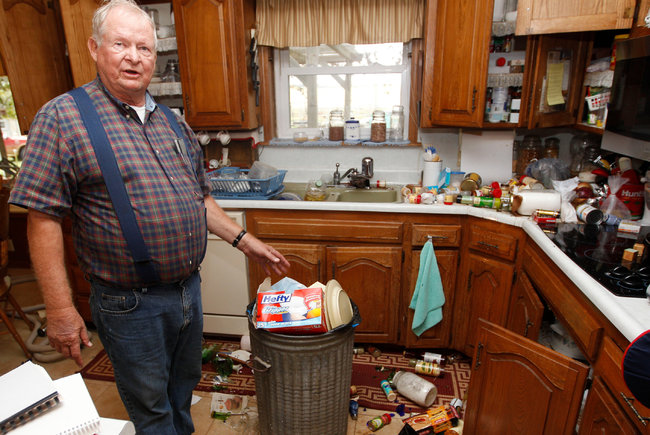Anne C. Mulkern, E&E reporter
Published: Friday, November 15, 2013
Unconventional oil drilling in the waters off Southern California uses
several chemicals considered hazardous, including at least one that a
federal agency connects to increased cancer risk, an environmental
group said yesterday.
The Center for Biological Diversity (CBD) in a 28-page letter asked the
California Coastal Commission to block offshore hydraulic fracturing,
or fracking, and cited a list of potential perils.
The green group identified chemicals used in offshore operations after
looking at oil and natural gas company disclosures on FracFocus.org.
“The fracking chemicals known to be used in California state waters are
alarming,” Emily Jeffers, Center for Biological Diversity’s staff
attorney, Oceans Program, wrote in the letter. “The Center’s analysis
of chemicals used in 12 wells and disclosed by the voluntary reporting
site FracFocus reveals that almost all of the chemicals used are
suspected of causing gastrointestinal, respiratory, and liver hazards,
as well as skin, eye, and sensory organ risks.
“More than half of the chemicals are suspected of being hazardous to
the kidneys, immune and cardiovascular systems, and more than one-third
are suspected of affecting the developmental and nervous systems,” the
letter added. “Between one-third and one-half of the chemicals used are
suspected ecological hazards.”
The green group said that the California Coastal Commission should use
its authority to prohibit fracking in waters off the Golden State
because it threatens coastal resources.
The commission has not had the chance to review the letter that arrived
yesterday, said Sarah Christie, the agency’s legislative director.
“The Commission staff is in the process of evaluating all of the
available information on offshore fracking, and will be discussing the
topic, as well as our role in the regulatory process, when the
Commission meets next month in San Francisco,” Christie said in an
email. “The Commission is committed to protecting coast and ocean
resources consistent with its mandate and authority in the Coastal Act
and the Coastal Zone Management Act.”
The commission had already planned to talk about offshore oil drilling
at its meeting next month, Christie said. It’s a follow-up to a meeting
in August, when the agency launched an investigation into how much
hydraulic fracturing is happening offshore and what power the
commission has to control it.
That followed a news report that regulators have allowed drilling using
fracking in the Pacific Ocean at least a dozen times since the late
1990s. The Associated Press unearthed the data through a Freedom of
Information Act request.
At that August meeting, Alison Dettmer, chief deputy head of the
commission’s Energy and Ocean Resources division, said the agency lacks
key data related to fracking, in which companies blast water laced with
sand and chemicals at high pressure to break apart rock formations and
release oil or natural gas.
In waters controlled by the federal government, there are 23 platforms
with outer continental shelf (OCS) plans granting approval for
exploration. Thirteen of those were authorized by the Coastal
Commission, Dettmer said in August. Of those, a dozen “have done some
form of fracking in the last 25 years,” she said. In addition, it has
been approved for Platform Gilda off Santa Barbara.
Dettmer will review the CBD letter before next month’s meeting,
Christie said.
Oil and natural gas industry trade group Western States Petroleum
Association did not respond to inquiries about the CBD letter and
claims on chemicals used.
Chemicals listed as hazardous
The Center for Biological Diversity in its letter said many of the
dozen wells where fracking is underway use chemicals with risks.
The green group lists seven chemicals that it said are most commonly
used in offshore wells. It said there are known health risks with those
compounds.
The ones listed include crystalline silica or X-Cide, which CBD’s
letter said is “classified as a hazardous substance under both the
Occupational Safety and Health Act (OSHA) and the Comprehensive
Environmental Response, Cleanup, and Liability Act (CERCLA, or
Superfund).”
The chemical is “harmful to skin, eyes and other sensory organs,
respiratory system, immune system and kidneys; mutagen. Known human
carcinogen,” the letter said. CBD drew that information from the
Endocrine Disruption Exchange Inc., or TEDX, which describes itself as
an organization “that focuses primarily on the human health and
environmental problems caused by low-dose and/or ambient exposure to
chemicals that interfere with development and function, called
endocrine disruptors.”
OSHA has issued a hazard alert on respirable crystalline silica, which
said that “hydraulic fracturing sand contains up to 99 percent silica.
Breathing silica can cause silicosis. Silicosis is a lung disease where
lung tissue around trapped silica particles reacts, causing
inflammation and scarring and reducing the lungs’ ability to take in
oxygen.”
The alert, which addresses the issue of worker exposures only, added
that “workers who breathe silica day after day are at greater risk of
developing silicosis. Silica can also cause lung cancer and has been
linked to other diseases, such as tuberculosis, chronic obstructive
pulmonary disease, and kidney and autoimmune disease.”
CBD’s letter also said offshore wells use methanol, which the green
group quoted TEDX as saying is “harmful to skin, eyes and other sensory
organs, respiratory system, gastrointestinal system and liver, brain
and nervous system, immune system, kidneys, reproductive and
cardiovascular system; mutagen.”
The letter also named glyoxal, sodium tetraborate, 2-butoxyethanol,
methyl-4-isothiazolin and ethoxylated nonylphenol as chemicals used in
the offshore wells.
“The chemicals used in the fracking process are extremely dangerous,
but the fate of their ultimate disposal is of even greater concern,”
the letter said. “Releases of fracking fluids onshore have led to fish
kills in freshwater bodies. Spilling or leaking of fracking fluids,
flowback, or produced water is also a huge problem. Spills can occur at
the surface, and there is a risk of underground migration of fluids.
Also, many fluids must be transported to and/or from the well,
presenting additional opportunities for spills.”
Special thanks to Richard Charter
